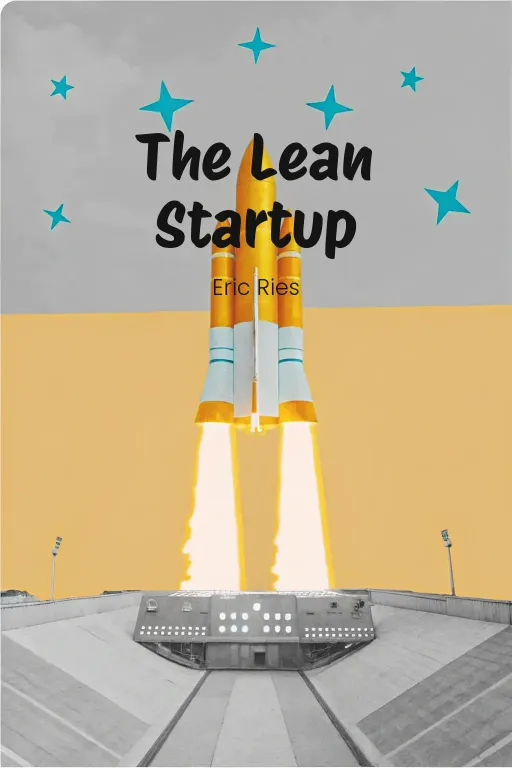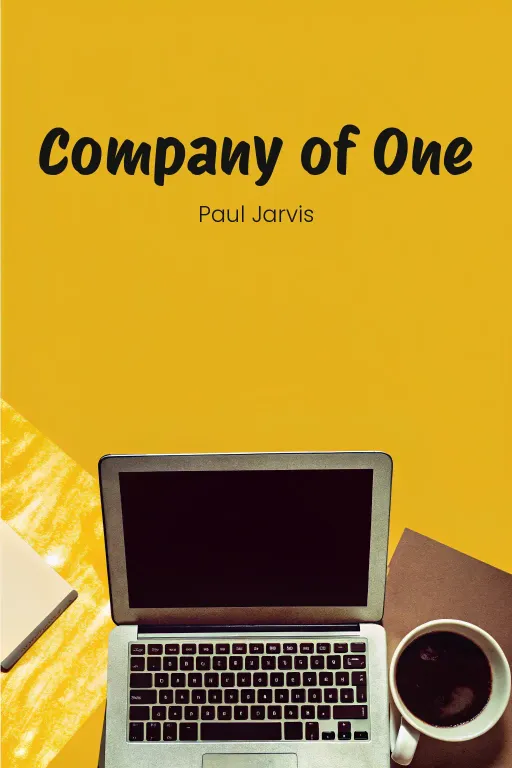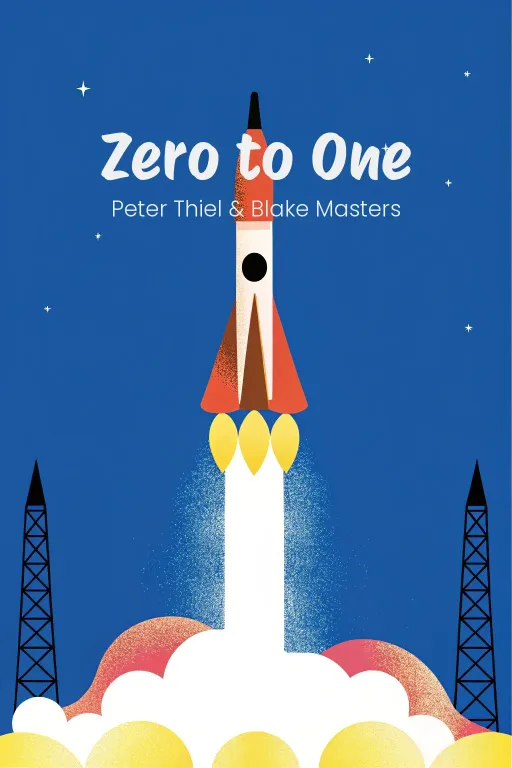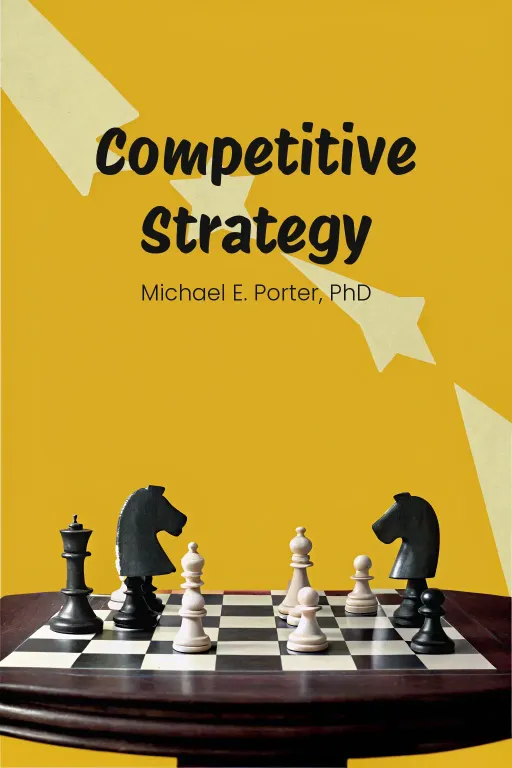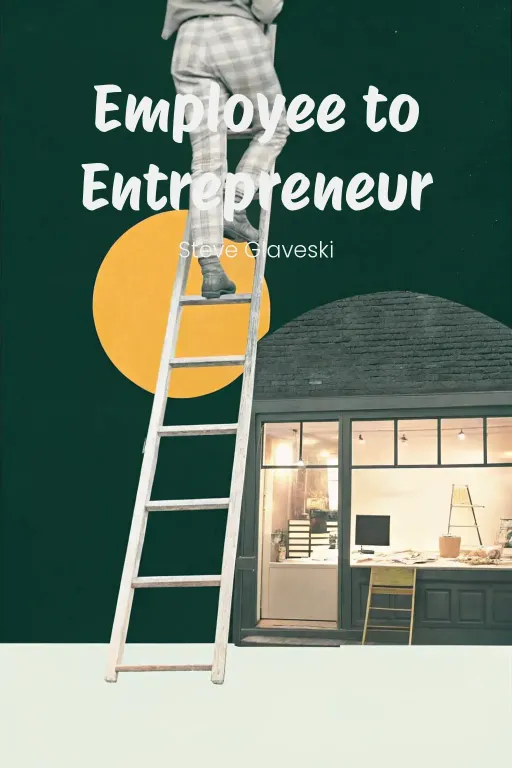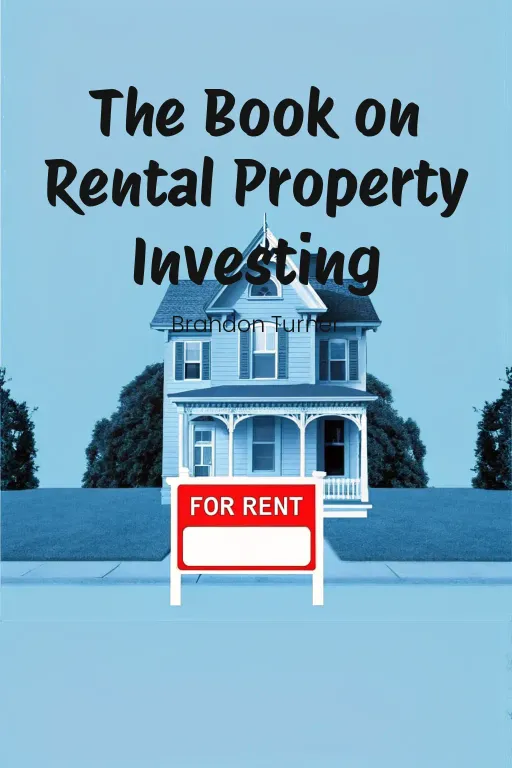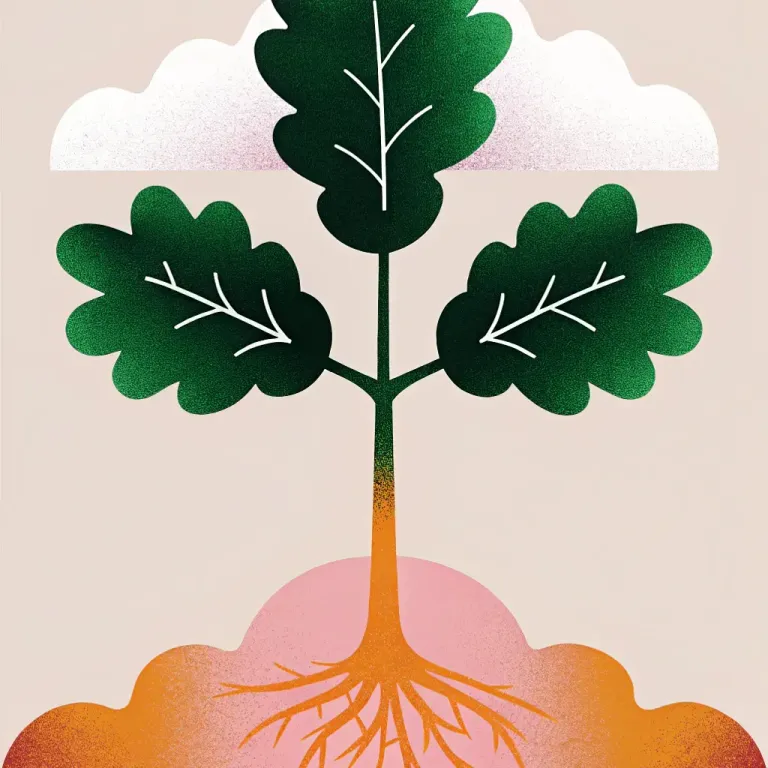
Find Your "Enough": Build a Business You Love
Podcast by Let's Talk Money with Sophia and Daniel
Why Staying Small Is the Next Big Thing for Business
Find Your "Enough": Build a Business You Love
Part 1
Daniel: Hey everyone, welcome! Today we're jumping into a potentially game-changing idea: what if businesses could “really” thrive by staying small, focused, and driven by purpose, instead of always chasing growth? Think of it like building a lighthouse – reliable, strong, guiding ships, rather than a skyscraper constantly reaching for the sky. Sophia: A lighthouse over a skyscraper, eh? I'm intrigued. Let me guess, Daniel, this is one of those… "think different" business philosophies that tells us to toss out the traditional playbook? What's fresh this time? Daniel: It's way more than just a different angle, Sophia. Paul Jarvis's Company of One pretty much demolishes the idea that growth should be the only goal. It argues for building businesses that put autonomy, meaningful work, and genuine relationships first, instead of scaling just because that's what everyone else is doing. Sophia: Okay, so defining success for yourself, instead of chasing the corporate ladder? All right, color me interested. What can our listeners expect from today’s episode? Daniel: Great question! We'll break it down into three key areas. First, we're going to redefine what growth “actually” means –hint: it’s not just about endless revenue or a massive team. Second, we'll dig into simplicity and focusing deeply on your customers. And finally, we’ll look at how building sustainably can create lasting success and a business you actually enjoy. By the end of this, you might just see that small, well, small can be truly powerful. Sophia: Alright, I’m in. But don’t think I’m not going to be firing off the hard-hitting questions. Let's see how strong this lighthouse metaphor really is.
Rethinking Growth and Purpose
Part 2
Daniel: Okay, let's dive right back in, shall we? We’re rethinking growth and purpose, which is really the core of Paul Jarvis's “Company of One”. Traditional business wisdom tells us success means scaling up, fast. But Jarvis flips that, asking: what if the “real” win is knowing when you've hit "enough"? That's the key word, "enough." Sophia: "Enough," huh? A welcome change from the relentless "more, more, more." But Daniel, let's be real, isn't that a tad idealistic? We're programmed to think if you’re not growing, you’re dying. What’s wrong with that thinking? Daniel: Well, consider the Startup Genome Project. They looked at over 3,200 startups, and a shocking 74% failed—not from bad products, but from scaling too early. Think about it! They crumbled under their own weight because they tried to grow faster than they could handle. It’s like building a skyscraper on a flimsy foundation. Growth at any cost often means compromising on quality, efficiency, even the well-being of the founders and their teams. Sophia: Fair enough. But startups kind of have that "go big or go home" thing built-in, right? Scale fast, dominate, and hope you’re still standing when the dust settles. So, how does Jarvis suggest we break free from that mindset? Daniel: That’s where the "enough" mindset comes into play. It's about rewriting the whole story. Instead of chasing endless expansion, businesses can focus on being sustainable, autonomous, and doing work that actually matters. Sean D’Souza’s example really hits it home. He deliberately caps his annual revenue at $500,000, even though he could earn more. Why? Because he values balance and he gets to focus on creative, high-quality work and still have a life. It's not about bigger; it's about better. Sophia: Okay, playing devil's advocate again. Isn’t that kind of a privileged point of view? Most businesses need to scale just to survive. If you're not making enough, how do you even get to the point where you can say, “Okay, I'm good, I’ll stop here”? Daniel: That's a valid question, Sophia. D’Souza's approach echoes what Jarvis stresses: calibrating "enough" to fit your situation. It's not about avoiding growth entirely, but about being intentional. For example, when Tom Fishburne left his corporate job to draw cartoons, he didn’t chase mass production or a huge team. He focused on quality and consistency. By staying small, he tripled his former income and kept his life—personally and professionally—aligned with his values. Sufficiency isn't about settling; it's about thriving on your own terms, you know? Sophia: Hmm, thriving by streamlining. Guess that forces you to focus on what’s truly important. Let's talk about autonomy, another big theme in “Company of One”. Sounds great in theory, but how realistic is it when you're dealing with clients, suppliers, and the constant pressure to stay competitive? Daniel: Autonomy isn't about isolating yourself. It's about making choices that align with your values, even in a connected, competitive world. Jarvis himself restructured his work to control his schedule and creativity. By staying small, he wasn't beholden to shareholders or market trends demanding constant growth. That freedom let him focus on meaningful work, rather than just hitting arbitrary targets. Sophia: Alright, but eventually, do you risk becoming irrelevant? I mean, if the world's moving at warp speed, how does staying small keep you competitive? Daniel: Actually, you stay relevant because you're small. Think about freelance design. Instead of chasing dozens of clients, a designer might focus on just a few, deeply understanding their needs and building real loyalty. When you prioritize fewer, stronger connections, you build a community—a network of advocates who spread the word for you. It's less transactional, more relational, which pays off in trust and longevity. Sophia: Okay, I’ll grant you that's a compelling idea, particularly in today’s over-commercialized world. But doesn't it also mean you might miss out on opportunities for innovation? Isn't growth partly about pushing boundaries? Daniel: That’s the beauty of simplicity—it cuts through the noise and lets you innovate with precision, you know? Try painting a masterpiece while juggling ten things at once. Impossible, right? Simplifying allows you to focus, experiment, and refine. Sean D’Souza’s model showcases this. Instead of launching endless new projects, he refines existing ones, improving their depth and value. That's productive innovation—not chasing novelty, but enhancing excellence. Sophia: Well, you've got my gears turning, Daniel. So, correct me if I'm wrong. Jarvis is basically encouraging entrepreneurs to ditch the rat race and measure success by autonomy, sustainability, and relationships? Sounds as much philosophical as it does practical. Daniel: Exactly! Jarvis argues that a fulfilling, profitable business doesn't have to be a sprawling empire. By rethinking growth and purpose, companies can align their goals with their values, leading to not just financial success, but also personal fulfillment. The brilliant thing about the “Company of One” philosophy is it's universally applicable—whether you're a solopreneur, a freelancer, or even part of a larger organization.
Core Principles for Success
Part 3
Daniel: So, by questioning this idea that “bigger is always better,” we set the stage for understanding how businesses can actually thrive without this constant, uncontrollable scaling. And that leads us right into the core principles behind the Company of One philosophy. It's not just some catchy phrase, it's a whole model with real, actionable steps. Today, we really want to dive into the three main pillars: building genuine customer relationships, prioritizing purpose over, say, fleeting passion, and really embracing a broader skillset instead of this whole hustle-till-you-drop mentality. This hopefully connects the theory we've been discussing with tangible ways to make these ideas a reality. Sophia: Okay, Daniel, sounds like we're getting into the practical stuff now. I'm definitely interested. So where do we even begin? Daniel: Let's start with what's at the heart of any successful business, whether it's small or large: those customer relationships. Paul Jarvis emphasizes that businesses don't need a million fleeting customers. You need loyal, engaged ones. It's about digging deep, not spreading wide. Okay, so, let me bring up Rackspace as an example. They're a cloud hosting company that built an amazing reputation for incredible customer service. There's this story – a customer called support late one night and just mentioned, in passing, that they were really hungry. And guess what the Rackspace rep did? They ordered a pizza for the client while they were solving the technical issue! Seriously! That one act of kindness went completely viral for the company, solidifying their image and boosting customer loyalty tremendously. Sophia: A pizza delivery from a hosting company, huh? That's a branding move I wouldn't expect! But, seriously, Daniel, while it's a great story and all, these anecdotes feel like a one-in-a-million kind of thing. Can companies really function based on these random acts of customer kindness? What's the larger takeaway here? Daniel: The real point is breaking out of that purely transactional way of thinking. Rackspace didn't build loyalty by offering some coupon or free trial. They created an emotional connection. See, when customers feel genuinely valued, they turn into advocates. Research actually proves this! I mean, something like 83% of new business can come from referrals that are based on personal relationships. Can you imagine the level of trust and reputation that one pizza built? That's word-of-mouth marketing at its absolute finest. Businesses need to really prioritize these meaningful gestures that show you care. That will turn clients into long-term allies. Sophia: Okay, got it. So, instead of aiming for dozens of superficial connections, you're suggesting a focus on a handful of really meaningful ones. But doesn't that put a ceiling on growth? If you're focused on that depth, aren't you potentially missing out on bigger opportunities? Daniel: I get it, that's a totally valid point. But honestly, it's about working smarter, not harder. Paul Jarvis actually puts it this way: Focus on fewer customers and overdeliver on the value you give them. Think of Derek Sivers, who founded CDBaby. His business took off by being super responsive to indie musicians. He didn't try to build a massive platform. Instead, he really personalized the whole experience. Do you remember how he sent these quirky shipping confirmation emails that felt like little handwritten postcards? Those small details made musicians feel seen and appreciated, and they kept coming back. I mean, the result? A multi-million-dollar business that still had, as its core focus, the purpose of helping independent artists. Sophia: Okay, and that's a nice segue into your second principle – prioritizing purpose over passion. Let me tell you, every entrepreneur I've met says passion is the only thing that matters. What makes purpose a better North Star here? Daniel: Passion is great! It's what gets you out of bed in the morning, all bright-eyed and bushy-tailed, right? But passion can also fade, or sometimes can even mislead you. Purpose, on the other hand, is what aligns your work with your core values, your skills, and what your customers actually need. Let's go back to Derek Sivers. His purpose wasn't, "Oh, I love online music platforms!" It was, "I want to empower musicians to bypass record labels that take advantage of them." That's what drove his decisions and helped his business stay afloat, even when times were tough. Purpose gives your work direction and longevity. Passion is a spark; purpose is that steady flame. Sophia: So you're essentially saying that, instead of asking myself, "What do I love?", I should be asking, "How does my work serve others best?" I swear, I can almost hear the self-help industry collectively gasping right now. Daniel: Exactly, Sophia! Purpose ties what's personal to something practical. It's not just, "What makes me happy?" but "What problem can I solve while staying true to who I am and what really matters to me?" Sivers didn't just wake up one day and randomly decide to build a platform for musicians. He saw a gap, knew he could fill it, and kept that purpose guiding him. That's what makes his impact – and the business itself – so enduring. Sophia: Fine, Daniel. I'll give you that. Purpose seems sturdy enough. But before we crown it king, I still need to understand – how does all this play into the work culture side of things? Because I know hustle culture is something that Jarvis critiques, and honestly, there's no way to escape it these days. Daniel: Well, that naturally brings us to our third core principle – embracing that generalist approach instead of subscribing to the hustle culture. Jarvis makes a really compelling point: working longer and harder doesn't necessarily mean success. Burnout? That does not build resilience. Instead, he champions this idea of a generalist approach – cultivating a range of adaptable skills, so that you're flexible enough to handle different challenges without completely running yourself into the ground. Sophia: Okay, now I'm curious. Is there a story that kind of sums this up? Where's the real-world example of generalism beating the daily grind? Daniel: Absolutely. Take a look at Hudl. Kyle, who was one of their design leaders, faced a real problem: they didn't have nearly enough designers to meet their growing demands. So, instead of just overloading who was already on his team, or just scrambling to hire new people, he created efficiencies within the team itself. I mean, he introduced a shared style guide, streamlined processes, and really just encouraged collaboration. Suddenly, they were doing more with less! It wasn't about grinding harder; it was about working smarter by being adaptable and strategic. That's generalism in action. Sophia: You make it sound almost too simple, but isn't there a risk of spreading yourself way too thin with this generalist mindset? I mean, if you're trying to do everything, won't you end up not doing anything particularly well? Daniel: And that's where focus comes into play. Jarvis isn't suggesting you be a jack-of-all-trades in some chaotic way. He means really having a broad, supportive toolkit that gives you flexibility. Take Basecamp as an example. David Heinemeier Hansson has explicitly rejected hustle culture, and he promotes shorter work hours, and lets his employees just focus during their most productive times. That's why they're continuously innovating while still maintaining a healthy work-life balance. Generalism allows them to pivot and adapt to any circumstances, while avoiding the pitfalls of being too specialized. Sophia: Okay, so let's recap all of this. We've got these three principles – forming deep connections with our customers, letting purpose guide the work, and rejecting that toxic grind culture, and in embracing adaptability instead. I mean essentially, Company of One is asking us to totally rethink not just how we do business, but why... and to do it all while keeping our sanity, right? Daniel: You totally nailed it, Sophia. It's about redefining what success even means so that it aligns with what's truly meaningful, both for the business and for the entrepreneur. By focusing on purpose, relationships, and balance, this approach can build something sustainable, impactful, and yeah, more fulfilling. It's proof that thriving doesn't have to mean expanding endlessly or constantly sacrificing your well-being. Sophia: Well, maybe there's merit to this whole lighthouse analogy. Alright, Daniel, I'm officially intrigued! So, what's your final thought? If people only take away one thing from these principles, what should it be? Daniel: Super simple – the idea that success isn't one-size-fits-all. Find your "enough", and build a business that reflects it. It's not about chasing giants; it's about standing strong, grounded by purpose, authenticity, and resilience, even if the system kind of tells you to do otherwise.
Sustainable Business Practices
Part 4
Daniel: So, with the philosophy kind of set, let's dive into the practical tools and ways of thinking that make this model work, and actually be rewarding. That leads us to sustainable business practices. This topic really brings it all together, showing how the 'Company of One' idea works in the real world and how it can last. It's where theory meets reality, Sophia—with simplicity, focus on customers, and smart money management. Why don't we start by breaking down how simplicity makes things sustainable? Sophia: Okay, simplicity – it sounds great, right? But, I mean, my first thought is, "Easier said than done." What exactly does Jarvis mean by making simplicity the base of a business? Is he just talking about cutting corners? Daniel: Not at all—more like streamlining. Here's a great example: Jeff Sheldon's company, Ugmonk. Back in 2008, he started with just four T-shirt designs. Four! Instead of trying to pump out tons of stuff or compete on price, he really zeroed in on quality and creating a unique brand. He started small, with only $2,000 he borrowed from his dad. And all the profit went back into making his products better—not just growing for the sake of growing. Sophia: Four T-shirts, slow growth—that sounds, well, almost… quaint. How did he go from those four designs to a business that actually lasts? Daniel: That's the clever thing about simplicity, Sophia—it let him make changes carefully. Sheldon was able to really listen to his customers, tweak his designs based on what they said, and deliver top-notch products. That created a loyalty you can't buy with just throwing money at scaling up. His goal wasn't to take over the market, but to stand out by doing a few things incredibly well. And you know what? That loyalty turned his customers into his biggest advocates. They spread the word, sales went up, and Ugmonk did well without the craziness of growing too fast. Sophia: Okay, I see your point. But what about companies that want to be huge? Surely not every business can stay that small. Doesn't keeping things simple eventually hold you back? Daniel: Not necessarily. Jarvis would argue it helps you focus, which is key for long-term success. Why don’t we look at customer-focused businesses? Simplicity works really well for businesses that really focus on relationships, not just chasing numbers. Take Onsen Keiunkan, the oldest hotel in the world that's been running since 705 AD. That's, like, unbelievably old, Sophia. Sophia: Over 1,300 years? That's insane. How did survive that long when so many other hotels have disappeared? Daniel: By staying small and really focusing on their customers. They've kept the hotel under forty rooms and put all their effort into providing amazing service. Guests get personalized attention, and the natural hot springs—that is the heart of the experience. By not expanding, Onsen Keiunkan hasn't lost its charm or quality. The result? Generations of families keep coming back, passing on their loyalty. Sophia: A hotel that old finding value in staying intentionally niche—it’s like flipping the business playbook upside down. But—and here’s the skeptic in me—how does that square in a world where customer loyalty feels so fleeting? Maybe what worked for centuries in Japan wouldn’t play out as smoothly in today’s hyper-competitive environment. Daniel: Actually, that’s why it’s so relevant. Onsen Keiunkan proves that focusing on authenticity and relationships creates something unique. Deep loyalty comes from trust and connection, not bigger buildings or fancier features. And it applies today—when personalized service in business can set you apart in crowded markets. Jarvis emphasizes: real relationships create resilience. Sophia: Alright, Daniel, I’ll concede the timeless messaging. But let’s tackle another big piece of the sustainability puzzle—money. I mean, no matter how authentic you are, mishandling finances turns the whole ship into a sinking wreck. What’s his take there? Daniel: You're absolutely right—it is the backbone of staying afloat. Jarvis stresses that being financially responsible is crucial for any business that wants to last. And there's a cautionary tale that shows this perfectly: Kongō Gumi. Founded in 578 AD, they were the oldest construction company in the world, building Buddhist temples. For centuries, they did well by sticking to what they knew. But in the 1990s, they moved into real estate, trying to cash in on Japan's economic boom. Then the bubble burst. They took on too much debt compared to what they owned, and they went bankrupt in 2006 after 1,428 years. It's a stark reminder of what unfocused growth can do. Sophia: Bankruptcy after over a millennium? Ouch. But hold on—there’s clearly a balance to strike. You can’t avoid all risks or avoid venturing outside your comfort zone, right? Otherwise, wouldn’t you risk stagnation? Daniel: True, Sophia—taking calculated risks is part of business. But the important thing is to stay aligned with your strengths and grow at a reasonable pace. Businesses that overextend themselves often lose sight of what made them special. A better approach is to stay flexible, focus on refining your existing model until sustainable growth happens naturally. Jarvis argues that sound financial goals and a strong operational core—rather than chasing trends—allow businesses to weather even major challenges. Sophia: A construction firm betting on real estate and losing big: if that’s not a wake-up call, I don’t know what is. So let me sum this up: simplicity keeps you focused, customer loyalty builds relationships, and fiscal responsibility safeguards your future. Am I right? Daniel: Exactly, Sophia. Jarvis offers these lessons as a guide for long-term success that values sustainability over quick wins.
Conclusion
Part 5
Daniel: Okay, Sophia, let’s bring this home. What we’ve been digging into today is really a fundamental shift in how we think – moving away from the relentless chase for “more” to a conscious decision about identifying “enough”. Paul Jarvis is basically urging us to push back against the constant pressure to scale infinitely and, instead, put autonomy, purpose, and simplicity at the forefront as our real measures of success. Sophia: Right, and those key ideas we talked about – cultivating strong customer relationships, making purpose a higher priority than fleeting passion, and ditching that whole toxic-hustle mentality in favor of being adaptable – those aren’t just abstract concepts. They’re concrete, proven methods. Whether it’s Ugmonk’s commitment to keeping things simple or Onsen Keiunkan's centuries-long tradition of caring for their customers, these concepts have stood the test of time. So, are we saying these principles are just as relevant now as they’ve ever been? Daniel: Absolutely. “Company of One”, at its core, isn't suggesting we abandon ambition. It's challenging us to redefine what success looks like. It's about building businesses, lives, legacies, that value being authentic, sustainable and keep going in the face of difficulty. Sophia: Okay, so here’s the bottom line: Forget this idea that bigger automatically means better. Start asking yourself, “What does ‘enough’ actually mean to me?” Find that focus, nurture your purpose, and build something that matters – on your own terms, not based on what everyone else is doing. How would someone apply this to modern urban life? Daniel: Exactly – success is personal, and you don't have to sacrifice your own well-being to thrive. To our listeners, take a moment to really evaluate what you’re aiming for. Enough isn’t just a final destination; it’s a decision. What will you choose?
